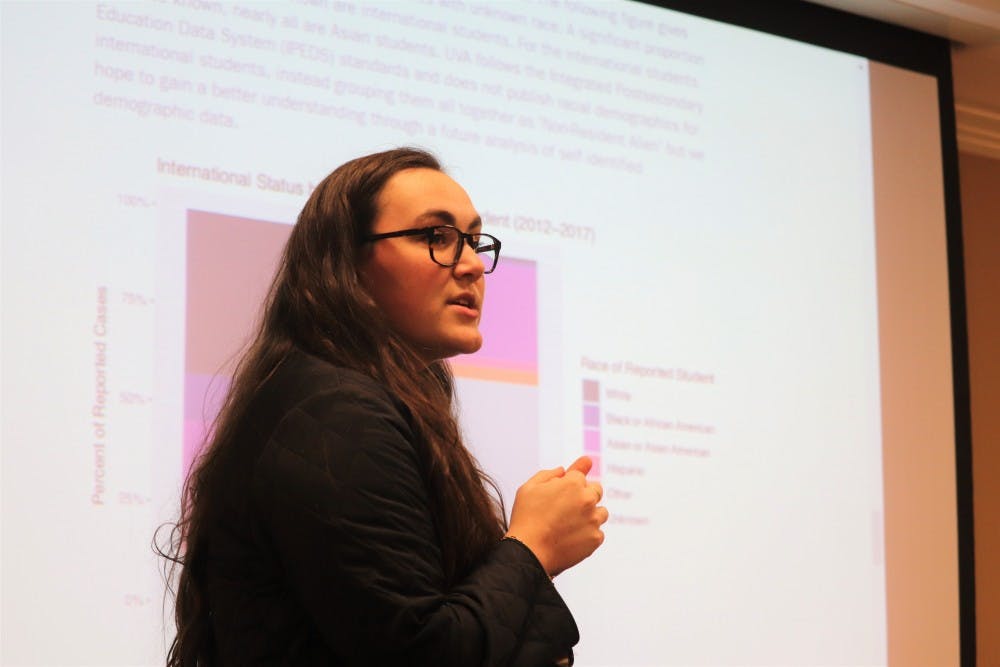The Honor Committee released its long-awaited Bicentennial Report to the public Monday — a historical and statistical review of the Honor System at the University compiled and analyzed by the Committee’s Assessment and Data Management Working Group.
The report is the largest internal review of Honor at the University, featuring data from a century of annual dismissals, three decades of data on all sanctions and six years of full data from reports and outcomes. Sanctions are those outcomes of cases in which a student is ultimately considered guilty — whether through an informed or conscientious retraction, leaving the University admitting guilt or through a guilty verdict as handed down through an Honor trial.
The most recent review conducted by Honor was the Honor Audit Commission in 2018 in which the Committee assessed how the body is perceived by the student body.
As a subcommittee of the Honor Committee, the Assessment and Data Management Working Group is — in the words of the Bicentennial Report — “tasked with creating and maintaining transparent, consistent, and secure systems to store pertinent demographic, public opinion, and internal evaluation data to inform Honor policy and dialogue so that Honor is accountable to itself and its goals and its members can make informed decisions on how best to serve the students and the University.”
The foremost goals of the report, as stated in its executive summary, include creating conversation, educating students and opening the door for further analysis of the Honor System.
“We hope this report fosters conversation about how students experience Honor at the University and begins an open dialogue on how we can all work towards a better system together,” the report states.
Between 1987 and 2017, according to the report, certain student groups at the University have faced sanctioning by the Honor Committee at disproportionate rates relative to the school’s total population. The white student population at the University has typically received between 30 and 40 percent of sanctions, although the rate was about 46 percent between 2000 and 2004.
Since 1987, African American students at the University have consistently been subject to higher sanction rates than other student groups, although this disparity has declined significantly in recent years.
Between 1987 and 1989, African Americans comprised 42 percent of sanctioned students, while the African American student population at the time was estimated to be around only 9 percent.
As the Asian American student population has gradually increased since 1991, the sanction rate for these students has significantly outpaced their presence at the University. The sanction rate increased by nearly three times to almost 21 percent between 1990 and 1994, despite only a slight increase in the Asian American student population. The rate more than doubled to nearly 50 percent between 2010 and 2013 and increased to about 53 percent from 2014 to 2016.
Between 2012 and 2017, Asian American students comprised 27.2 percent of all reports, while African American students made up 8.7 percent. By comparison, about 30 percent of reports were white students, and white students made up 58 percent of the student population in 2017.
African American students are over-represented at 8.7 percent of reported students while making up only 7 percent of the student body. However, the report states that the proportion of black students relative to all reported cases has declined significantly over the past 30 years. Hispanic students are underrepresented, making up 6 percent of University students but 3.6 percent of reported students.
In an interview with The Cavalier Daily, Ory Streeter, fourth-year Medical student and Honor Committee chair, commented on the importance of the report for reflecting on the role of Honor at the University, specifically with regards to closing racial and other demographic disparities in the system.
“It cannot be overstated how important releasing data like this is, just because the Honor Committee for so, so many years, just has not released data like this,” Streeter said. “We're hoping is that this is going to set a precedent for more transparent communication with the University community about the information that we do have.”
As part of the report, the Informed Retraction sanction option for students was reviewed in-depth. For the past three years, according to the report, around 40 percent of reported students have chosen to file an informed retraction.
The IR allows a student who has been reported to the Honor Committee for an alleged Act of Lying, Cheating or Stealing to take responsibility both by admitting such offense to all affected parties and by taking a full two-semester Honor Leave of Absence from the University community.
After the Informed Retraction (IR) was incorporated into Honor’s Constitution in 2013 via University-wide referendum approved with 64 percent of the vote, the Committee’s sanctioning process was immediately altered, according to the report. Under the previous system, students could be found not guilty through an Honor trial or could submit a CR for an Honor offense, in which a student admits guilt before being reported and is allowed to make amends. Otherwise, a guilty verdict still resulted in an immediate dismissal from the University. Between 2012 and 2017, the IR comprised the majority of all sanctioned outcomes and more than 22 percent of all cases.
A complete copy of the report and additional information regarding Honor’s history, evolution and development is linked here.







